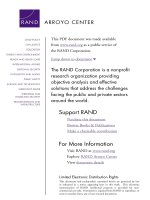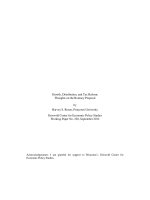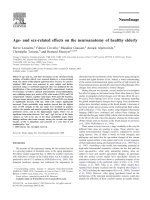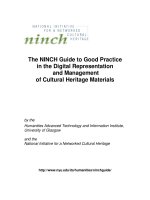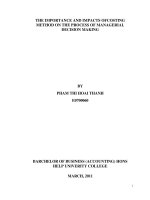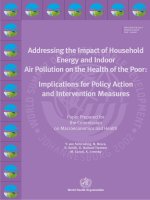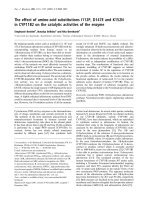RCUK Policy and Code of Conduct on the Governance of Good Research Conduct pptx
Bạn đang xem bản rút gọn của tài liệu. Xem và tải ngay bản đầy đủ của tài liệu tại đây (75.89 KB, 16 trang )
INTEGRITY, CLARITY
AND GOOD MANAGEMENT
RCUK Policy and Code of
Conduct on the Governance
of Good Research Conduct
Updated October 2011
Integrity, Clarity and Good Management
Contents
Section 1:
Guidelines for the Management of Good Research Conduct
Section 2:
Good Research Conduct Code
Section 3:
Guidelines for the Reporting and Investigation of Unacceptable
Research Conduct
Annex:
Letter sent to all heads of universities, colleges, Research Council
institutes and RCUK recognised research organisations
2
RCUK Policy and Code of Conduct on the Governance of Good Research Conduct
July 2009
Integrity, Clarity and Good Management
Section 1
Guidelines for the Management of Good
Research Conduct
All research should be conducted to the highest levels of integrity, including
appropriate research design and frameworks, to ensure that findings are robust
and defensible. Researchers should also adhere to the highest level of research
ethics, in line with requirements set out by national and international regulatory
bodies, professional and regulatory research guidance and research ethics
frameworks issued in appropriate areas.
The onus should lie with the researcher to establish that s/he has always met the
highest standards that could reasonably be expected of them and with the
employing institution to ensure that systems are in place to support and re-
inforce this.
Research or
ganisations (ROs) which employ or train researchers should also
ensure that sound systems are in place to promote best practice.This should
apply to all research within the organisation, irrespective of whether it is funded
through the UK Research Councils, other public monies, or any other sources.
These systems should include:
• training and development modules to ensure that all researchers are aware
of best practice requirements;
• training needs analysis for all new employees, especially but not exclusively
for those who have not received formal training (at for example PhD level)
and those from non-research organisations or institutions outside the UK;
• mentoring and promotion of good research conduct roles for key research
managers within the organisation;
• clear requirements for preservation of relevant primary data, laboratory
notebooks and other relevant mater
ials;
• stewardship responsibilities for heads of laboratories and departments, so
that they activ
el
y promote and repor
t on activities which ensure best
research practice within their domain;
3
Section 1
Integrity, Clarity and Good Management
• the observation of guidance from publishers and funders on the standards
which they expect to be applied.
Such systems will help to minimise poor or unacceptable research conduct. Key
elements of such procedures should include the following:
Clear policy statements
These should:
• include clear guidance on what is acceptable and not acceptable in line with
the RCUK Code of Conduct and those of other relevant professional
bodies;
• be drawn to the attention of all staff on appointment;
• be easily available at all times in guidance manuals and on websites.
Clear managerial arrangements
• ROs should have published procedures which are readily accessible, both
within the organisation and externally, for the normal supervision and
management of research conduct, integrity and ethical issues, and for the
reporting by individuals of any concerns about poor practice in these areas.
• The procedures should clearly identify the senior person in the RO (and
where appropriate in departments, schools or faculties) responsible for
ensuring good research conduct, who should receive regular reports on
these matters, and to whom any genuine concerns or allegations
(supported with appropriate evidence) may be taken.
• Systems should include training and development modules to ensure that
managers are aware of their responsibilities.
• There should be clear mentoring and promotional roles for key research
managers within the organisation and these should be communicated to all
junior staff.
•
Heads of labor
ator
ies and depar
tments should ha
ve clearly defined
stewardship responsibilities, so that they actively promote and report on
activities which ensure best research practice.
4
Integrity, Clarity and Good Management
Section 1
Training and mentoring policies
• All ROs should have in place systematic procedures for training and
mentoring.
• They should ensure that all relevant staff are aware of the procedures and
how any cases should be reported.
• These should also cover standards to be applied not only in the conduct of
research but in publication of materials, preparation of conference papers,
etc. and the conduct of peer review.
Ethical approval procedures
• ROs should have clear and full policies on ethical standards.
• ROs should have clear procedures for obtaining ethical approval for
research, which are communicated effectively to all relevant staff.
• Where ethical approval is delegated to schools and departments,
procedures should be in place to ensure equity of ethical approach across
the whole of the research organisation.
• Appropriate procedures to obtain clearly informed consent from research
participants should be in place.
• There should be clear supervisory arrangements for delegated procedures.
5
Section 2
Integrity, Clarity and Good Management
Good Research Conduct Code
CONTEXT
This code is relevant to all individuals involved in research, irrespective of the
subject of research, entry route into research or any other consideration, and
including:
• researchers;
• research support staff;
• students;
• research managers and administrators.
All are expected to observe the highest standards of research integrity and to
embed good practice in all aspects of their work, including the training of new
researchers.They must operate honestly and openly in respect of their own
actions and in response to the actions of others involved in research.
1
The spectrum of inappropriate behaviour is wide, ranging from minor
misdemeanours which may happen occasionally and inadvertently, to significant
acts of misappropriation or fabrication. Poor practices, such as weak procedures
or inadequate record-keeping which may jeopardise the integrity of the research
but might only require further training or development rather than formal
disciplinary action, are normally a matter solely for the employer.
This code therefore concentrates on entirely unacceptable types of research
conduct. Individuals involved in research must not commit any of the acts of
research misconduct specified in this code.
UNACCEPTABLE RESEARCH CONDUCT
Allegations should be investigated by the individual’s employer and proven cases
must be notified to the research funder.
6
1
See Council for Science and Technology, Universal Ethical Code for Scientists (2006)
Integrity, Clarity and Good Management
Section 2
Unacceptable conduct includes each of the following:
Fabrication
This includes the creation of false data or other aspects of research, including
documentation and participant consent.
Falsification
This includes the inappropriate manipulation and/or selection of data, imagery
and/or consents.
Plagiarism
This includes the general misappropriation or use of others’ ideas, intellectual
property or work (written or otherwise), without acknowledgement or
permission.
Misrepresentation, including:
• misrepresentation of data, for example suppression of relevant findings
and/or data, or knowingly, recklessly or by gross negligence, presenting a
flawed interpretation of data;
• undisclosed duplication of publication, including undisclosed duplicate
submission of manuscripts for publication;
• misrepresentation of interests, including failure to declare material interests
either of the researcher or of the funders of the research;
• misrepresentation of qualifications and/or experience, including claiming or
implying qualifications or experience which are not held;
• misrepresentation of involvement, such as inappropriate claims to
authorship and/or attribution of work where there has been no significant
contribution, or the denial of authorship where an author has made a
significant contribution.
Mismanagement or inadequate preservation of data and/or primary
materials, including failure to:
• keep clear and accurate records of the research procedures followed and
the results obtained, including interim results;
7
Section 2
Integrity, Clarity and Good Management
• hold records securely in paper or electronic form;
• make relevant primary data and research evidence accessible to others for
reasonable periods after the completion of the research: data should
normally be preserved and accessible for ten years, but for projects of
clinical or major social, environmental or heritage importance, for 20 years
or longer;
• manage data according to the research funder’s data policy and all relevant
legislation;
• wherever possible, deposit data permanently within a national collection.
Responsibility for proper management and preservation of data and primary
materials is shared between the researcher and the research organisation.
Breach of duty of care, which involves deliberately, recklessly or by gross
negligence:
• disclosing improperly the identity of individuals or groups involved in
research without their consent, or other breach of confidentiality;
• placing any of those involved in research in danger, whether as subjects,
participants or associated individuals, without their prior consent, and
without appropriate safeguards even with consent; this includes
reputational danger where that can be anticipated;
• not taking all reasonable care to ensure that the risks and dangers, the
broad objectives and the sponsors of the research are known to
participants or their legal representatives, to ensure appropriate informed
consent is obtained properly, explicitly and transparently;
• not observing legal and reasonable ethical requirements or obligations of
care for animal subjects, human organs or tissue used in research, or for the
protection of the environment;
• improper conduct in peer review of research proposals or results (including
manuscripts submitted for publication); this includes failure to disclose
conflicts of interest;
inadequate disclosure of clear
l
y limited competence;
misappropriation of the content of material; and breach of confidentiality or
abuse of material provided in confidence for peer review purposes.
8
Integrity, Clarity and Good Management
Section 3
Guidelines for the Reporting and Investigation of
Unacceptable Research Conduct
Research Councils UK (RCUK) accepts that each research organisation’s (RO)
procedures for ensuring reporting on and investigation into allegations of
unacceptable research conduct must be aligned to their own internal
requirements. In many cases ROs will need to align these with other human
resource and disciplinary/conduct procedures.
In the absence of existing procedures or where ROs are upgrading these, RCUK
also notes the published guidance by the UK Research Integrity Office (August
2008) on “Procedure for the Investigation of Misconduct in Research”. While
RCUK requirements are not as detailed as the model procedure set out by UK
RIO, there is no inconsistency between the two approaches and RCUK
recommends consideration and application of the detailed procedures set out by
RIO where these are appropr
iate. In addition, where international collaborative
research is involved, the guidance provided by the OECD Global Science Forum
on “Investigating Research Misconduct Allegations in International Collaborative
Projects” (A Practical Guide, April 2009) should be followed.
Procedures should be in place to cover the main requirements set out below.
Informal enquiries
Procedures for preliminary informal investigation, before it is concluded that
serious evidence exists to require a formal investigation, should not be onerous
and should be set within the normal organisational/institutional procedures.
• They should help ensure that a relatively quick decision should be made on
the first stage of whether a concern or allegation contains such sufficient
evidence to be taken forward to a full formal investigation – this should
wherever possible be within ten working days.
•
This should be the responsibility of a senior member of the RO, advised
where necessary by one or two other colleagues who can be seen as
clear
l
y independent of the complainant and of the subject of an
y complaint.
9
Section 3
Integrity, Clarity and Good Management
• Discreet investigations may be desirable at this stage until clear evidence of
individual behaviour has been established.
• There should always be an opportunity for response by a complainant if
the allegation is not accepted and if they believe that they have been
misunderstood or key evidence overlooked.
• Where evidence from the preliminary investigation indicates that
unacceptable conduct may have occurred, procedures should then provide
for a more detailed formal investigation.
Formal Investigations
At this stage the senior responsible officer may wish to appoint an independent
investigator to examine the allegations and make further enquiries.
• The investigator should be someone with sufficient knowledge and experience
of research and with relevant experience of investigating procedures.
• In very serious cases this may be a role for a small panel, but that would be
exceptional at this stage.
• Where an investigation is instituted any individuals who may face
allegations of misconduct should be informed.
• Where an investigation is about someone funded by or engaged with
RCUK (including acting as a supervisor for an RCUK postgraduate student
or engaged with peer review activities), even if it is about work not
connected with a grant from a UK Research Council, the case must be
reported to the relevant Council at this stage, and the Councils reserve the
right to take appropriate action, after consultation with the research
organisation, about any duties being performed for RCUK.
• In serious cases the question of suspension may need to be addressed, but
this should only arise where the presence of an individual is likely to hinder
an investigation or where it would be difficult for an individual to perform
their duties while this stage of an investigation is being conducted.
• If a person is suspended then the funding body which sponsors any
research with which they are involved or provides postgraduate support
which is aff
ected must be advised.
10
Integrity, Clarity and Good Management
Section 3
• The formal investigation should be completed as quickly as possible and
normally should not exceed four to six working weeks.
• If the allegations are dismissed at this stage, a clear statement should be
made both to the complainant and to the person complained against, as
well as to any other individuals who will have been aware of the allegations
and need to know the outcome. If the allegations are not dismissed in
whole or in part then formal disciplinary charges may be brought.
Procedures for formal disciplinary procedures
• This is a stage where formal charges are laid against an individual: normally
a formal panel of at least three members should be established to hear the
case.
• A separate person within the institution should have responsibility for
presenting the charges: the role of the panel should be to decide whether
the charges are proven and, if so, what sanction might be appropriate.
• The person against whom allegations are made should be given details of
the allegations in writing, the nature of the evidence against them, and be
given reasonable time and opportunity to respond to these.
• Where serious consequences might result from any proven charge
(including for example the possibilities of dismissal, demotion, removal of
rights as a researcher or public pronouncement on their professional
failings) the individual should have the right to professional representation
and/or assistance, including legal representation in appropriate cases: it
should be for the employing organisation to decide what representational
rights are appropriate.
• Where a charge is brought against someone funded by RCUK (including
acting as a supervisor for an RCUK postgraduate student or engaged with
peer review activities), even if it is about work not connected with a grant
from a UK Research Council, then this must be reported to the relevant
Council at this stage.The Councils reserve the right to take appropriate
action, after consultation with the research organisation, about any duties
being performed for RCUK.
11
Section 3
Integrity, Clarity and Good Management
• Where there is an allegation of serious misconduct which could lead to
suspension or termination of a researcher’s career, there should be
consideration of whether the panel should have external representation in
the interests of transparency.
• Formal guidance is available from various sources on how to conduct
formal investigations, including for example the UK RIO report
(August 2008).
Abortive termination of procedures at the informal enquiry, formal
investigation or disciplinary stages
• If procedures are terminated at any stage (for example by the resignation
of an individual) without conclusion that the complaints should be
dismissed, the RO should consider the seriousness of allegations
outstanding, the strength of evidence supporting the allegations, and the
implications for the future research career of the individual.
• Where serious concerns remain that misconduct may have occurred which
have not been resolved, the individual complained against should be
advised of this and be asked to see the investigation or hearing through to
conclusion.
• Where they do not agree to this, they should be advised that the details of
the outstanding case may (without prejudice) be passed to any future
employer or “bona fide” enquirer about their career at the research
organisation, and may also be passed to any appropriate regulatory or
professional supervisory body.
Imposition of sanctions and penalties
• Guidance on possible appropriate sanctions for various levels of
unacceptable conduct is under further consideration: this will be made
available to ROs in due course.
12
Integrity, Clarity and Good Management
Section 3
Reporting of sanctions or penalties which have been completed
• Where serious misconduct has occurred, especially where this would
appear to be pre-meditated, then a report to relevant statutory or
regulatory bodies may be required.
• Reports to relevant professional supervisory bodies and to any national
advisory body on research integrity established in the UK should also be
considered, and made, where appropriate in the public interest; further
guidance in this area may be developed in due course.
13
Annex
Integrity, Clarity and Good Management
This letter was sent to all heads of universities, colleges, Research
Council institutes and RCUK recognised research organisations.
I am writing to advise you that RCUK’s Policy Statement and Code of Conduct
for the management of research conduct in RCUK recognised research
organisations has now been finalised and I enclose two copies for your institution.
The document will also be posted on the RCUK website in August 2009.
From 1 October 2009, the guidelines and the associated Code will be a
requirement of all grants and awards from the Research Councils. We would be
grateful if you would communicate this throughout your institution, and also
ensure that the appropriate senior officer is given responsibility for ensuring the
policy is implemented.
I would also particularly draw your attention to the reference on page 9 to
arrangements for the supervision of research integrity in international
collaborative projects, and the recent guidance published by the OECD Global
Science Forum in this area.
If you have any general queries about the policy statement or Code, or their
implementation, please contact any of the colleagues below:
Glyn Davies Ros Rouse RCUK Enquiries
If you have any queries relating to specific Councils, the relevant contact officers
are listed below.
You will recall that the development of the policy and Code of Conduct
followed from the RCUK surveys of research organisation practice in 2006 and
2007; the major conference at the University of Keele organised with
Universities UK, the Funding Councils, and other major stakeholders in April
2008; and the RCUK consultation on good research conduct practice, the
outcome of which I advised you in April this year. I believe that this close
interaction with universities and research organisations has been very important.
Putting the policy and Code of Conduct in place is an important step forward in
the approach to these matter
s in the UK.
14
Integrity, Clarity and Good Management
Annex
As noted in the guidelines, there are a number of areas where further work may
be needed, and guidance is being reviewed and considered in consultation with
other stakeholders. RCUK has therefore established a scoping review to consider
further needs in this area jointly with Universities UK, the UK Department of
Health, the UK Funding Councils, and other associated major funders. The review
group is chaired by Professor Dame Janet Finch,Vice Chancellor of the University
of Keele, and we hope this will report by the year end.
May we thank you once again for your co-operation and assistance during our
consultation on this matter. We will seek to keep you fully informed of any
further developments.
Yours sincerely,
Professor Ian Diamond FBA FRSE AcSS
Chair, Research Councils UK Executive Group
RESEARCH COUNCIL OFFICERS WITH LEAD RESPONSIBILITY
FOR GOOD RESEARCH CONDUCT AND RESEARCH INTEGRITY
ISSUES
AHRC: Mr Gary Grubb
BBSRC: Dr Mari Williams
EPSRC: Mr Stuart Ward
ESRC: Mr Phil Sooben
MRC: Dr Frances Rawle
NERC: Dr Helen Butler
STFC: Dr Andrew le Masurier
Research Councils UK
Polaris House, North Star Avenue
Swindon,Wiltshire SN2 1ET
United Kingdom
Tel: +44 (0) 1793 444420
Fax:
+44 (0) 1793 444009
www.rcuk.ac.uk
